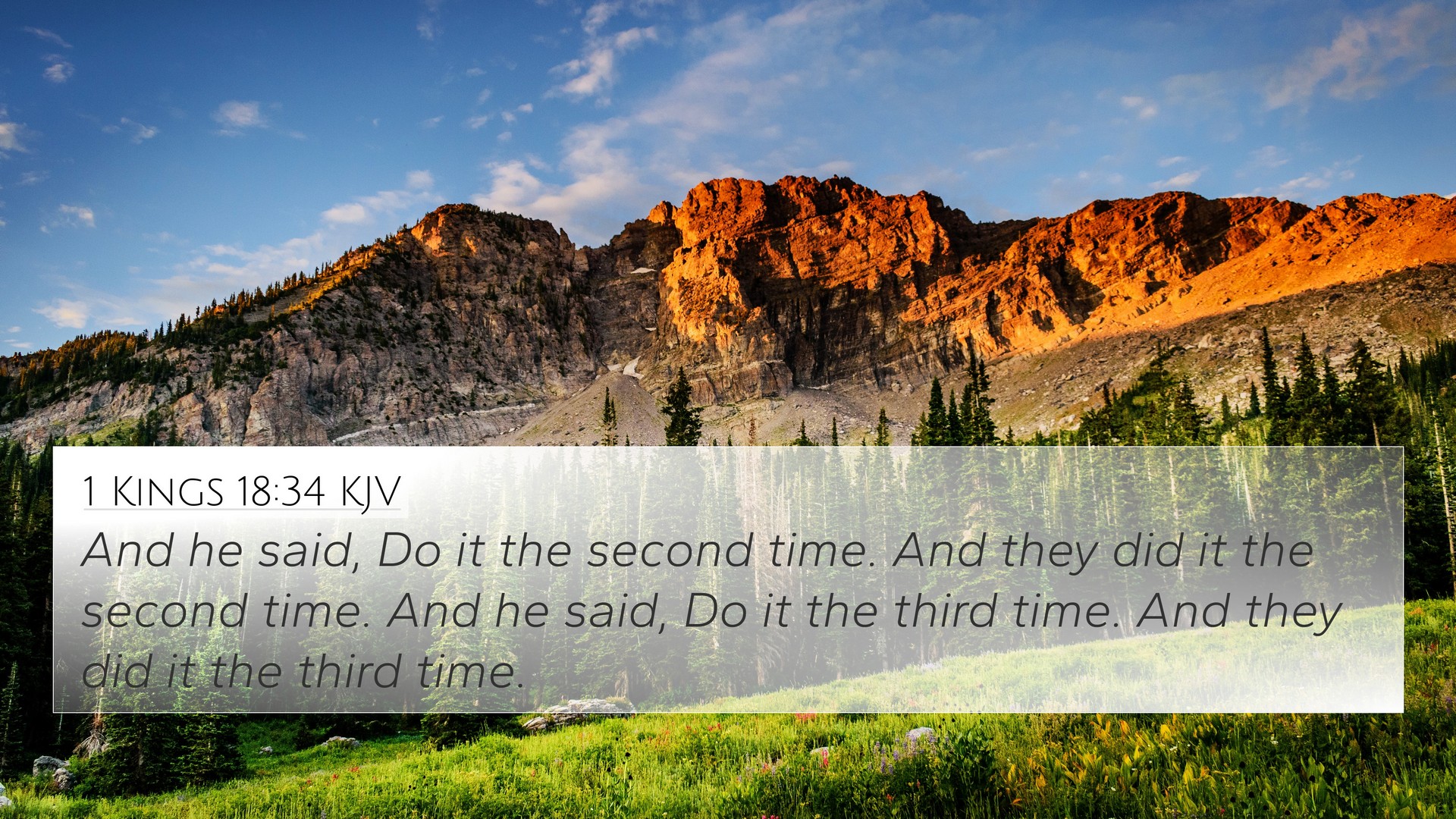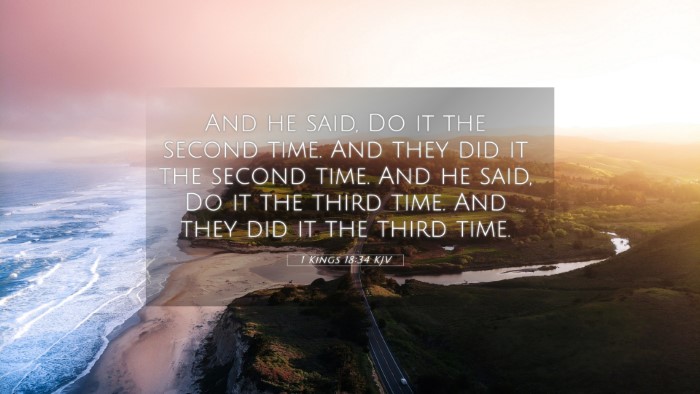Understanding 1 Kings 18:34
1 Kings 18:34 states: "And he said, Do it the second time. And they did it the second time. And he said, Do it the third time. And they did it the third time."
This verse is part of the narrative where the prophet Elijah challenges the prophets of Baal to demonstrate the power of their gods versus the God of Israel. The command to douse the altar with water multiple times emphasizes Elijah’s confidence in God's power to consume the sacrifice, even against seemingly insurmountable odds.
Summary of Interpretations
-
Matthew Henry’s Commentary:
Matthew Henry explains that Elijah's insistence on repeating the soaking of the altar demonstrates his faith in God's forthcoming miraculous intervention. The act symbolizes the complete surrender of earthly means in favor of divine power and showcases God's ability to work through and above human limitations.
-
Albert Barnes Commentary:
Albert Barnes highlights the significance of repetition. He notes that this method was intended to refute any skepticism regarding the authenticity of the miracle. The wetness of the wood became a testament to the true power of God, as fire could not normally consume such a soaked offering.
-
Adam Clarke’s Commentary:
Adam Clarke points out the symbolic elements of water in the context of sacrifice. He indicates that the excessive use of water makes the miracle even more profound, as it challenges natural laws. For Clarke, this act of faith by Elijah was not only a challenge to Baal but also a profound statement about the supremacy of God.
Cross References to 1 Kings 18:34
Understanding 1 Kings 18:34 is enhanced when we consider its connections to other Biblical texts. Below are notable cross-referenced verses:
-
Genesis 22:6-12:
The sacrificial theme and the provision of God’s hand in divine interventions connect this story to Abraham's faith in offering Isaac. The obedience and readiness to sacrifice reflect similar themes of faith.
-
Exodus 14:21-22:
Just as God parted the waters for the Israelites, the soaking of the altar serves as a metaphor for God’s miraculous providence in dire situations.
-
Luke 1:37:
"For with God, nothing shall be impossible" resonates with the theme of divine power showcased in Elijah’s challenge and God’s eventual fire from heaven.
-
Hebrews 11:1:
The verse on faith aligns with Elijah's confidence that God would deliver, illustrating what faith in action looks like.
-
Matthew 5:16:
The call for others to see the miraculous work of God through Elijah’s actions ties to the idea of letting one’s light shine, helping others recognize the truth.
-
James 5:17-18:
This scripture speaks to Elijah’s fervent prayer, linking the power of prayer with signs and wonders, emphasizing that effective prayer leads to heavenly fire.
-
2 Chronicles 7:1:
The divine fire that came down in response to the dedication of the temple mirrors the event at Mount Carmel, reinforcing God’s sovereignty over sacrifices meant for Him.
-
John 15:7:
The promise of answered prayer in connection with abiding in God aligns with Elijah's faith-filled actions, demonstrating the effectiveness of a life lived in unity with God.
Thematic Connections
The themes in 1 Kings 18:34 resonate with various other biblical narratives. The repetitive nature of Elijah’s command reflects the principle that faith often requires persistence. This connects with other scriptures that illustrate the nature of faith, the power of prayer, and God’s ability to intervene in seemingly impossible situations. Each cross-referenced verse supports deeper theological insights and encourages believers to seek God earnestly, trusting in His ability to respond.
Bible Study Techniques
For those exploring cross-references for deeper understanding, utilizing a Bible concordance can significantly aid in studies like this. Here are some tools for Bible cross-referencing:
- Bible cross-reference guide: Useful for identifying parallel passages.
- Cross-reference Bible study methods: Methods that emphasize thematic study of scripture and contextual connections.
- Bible reference resources: Texts and commentaries that provide insights on specific verses.
- Comprehensive Bible cross-reference materials: Detailed collections that offer exhaustive connections between verses.
Conclusion
The study of 1 Kings 18:34 through the lens of public domain commentaries enriches our understanding of faith, divine power, and scriptural interconnectivity. By examining the specified verse along with its cross-references and thematic implications, believers can better appreciate the profound lessons embedded in the biblical narrative.




